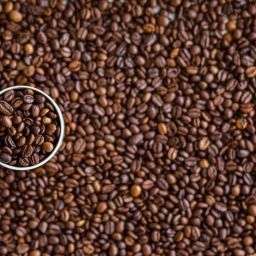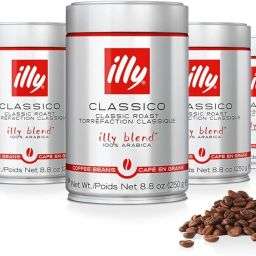
Swiss Water Decaf Coffee Beans represent a pinnacle of coffee decaffeination technology. Using a 100% chemical-free water process, this method removes caffeine while preserving the coffee beans’ inherent flavors and aromas.
Originating in Switzerland but now primarily based in Canada, the Swiss Water Process offers a health-conscious, environmentally friendly alternative to traditional decaffeination methods, catering to coffee enthusiasts who wish to avoid caffeine without compromising on taste.
Key Takeaways
- Understand the unique Swiss Water Process and its benefits over chemical decaffeination methods.
- Discover the health and environmental advantages of choosing Swiss Water Decaf Coffee.
- Learn how to select the best Swiss Water Decaf beans and brew them to perfection.
The Swiss Water Process Explained
The Swiss Water Process, a brainchild of Swiss innovation, has evolved significantly since its inception. It begins with immersing green coffee beans in hot water to dissolve the caffeine. The water is then passed through activated charcoal filters to remove the caffeine, while retaining the coffee’s essential flavors. This water, now saturated with coffee solubles but free of caffeine, is used to decaffeinate a new batch of beans, ensuring flavor integrity.
Benefits of Swiss Water Decaf Coffee
- Swiss Water Decaf Coffee is nearly 99.9% caffeine-free, offering a healthy alternative for those sensitive to caffeine or seeking a less stimulating beverage. By avoiding chemicals in the decaffeination process, it also reduces potential toxin exposure.
- The process is environmentally friendly, utilizing only water and sustainable practices. It generates less waste and avoids chemical residues that could harm the ecosystem.
- Unlike chemical methods, the Swiss Water Process maintains the coffee’s original flavor profile and aroma, ensuring a rich and satisfying cup.
Comparison with Other Decaffeination Methods
Decaffeination of coffee can be achieved through various methods, with the Swiss Water Process and chemical decaffeination being two primary techniques. Chemical decaffeination often involves solvents like methylene chloride or ethyl acetate to remove caffeine. While effective, these chemicals may alter the coffee’s flavor profile and raise health concerns due to chemical residue.
In contrast, the Swiss Water Process, a chemical-free method, leverages water, temperature, and time to create a caffeine-free coffee while maintaining the bean’s original flavors and aromas. This method not only ensures a cleaner cup but also aligns with eco-friendly practices, making it a preferred choice for health-conscious consumers and environmental advocates.
Selecting the Best Swiss Water Decaf Coffee Beans
When choosing Swiss Water Decaf Coffee beans, consider the origin, roast profile, and brand reputation. Beans from renowned coffee-growing regions, coupled with an appropriate roast level, can significantly influence the flavor. Look for brands that transparently detail their decaffeination process and source beans ethically.
Popular choices include brands like Kicking Horse, Volcanica, and Mayorga Organics, known for their commitment to quality and sustainability. By prioritizing beans that are certified organic and fair trade, consumers can enjoy a premium decaf experience that is both ethical and flavorful.
Brewing the Perfect Cup of Swiss Water Decaf Coffee
Brewing Swiss Water Decaf Coffee requires attention to detail to maximize its unique flavor profile. Use fresh, cold water and a precise coffee-to-water ratio, typically 1:16 for a balanced cup. Opt for a medium grind size, akin to sea salt, to ensure even extraction. Brewing methods like the pour-over, French press, or drip coffee maker can yield excellent results. Temperature control is crucial; aim for water between 195°F to 205°F.
Finally, regular maintenance of brewing equipment ensures consistent quality, preventing off-flavors caused by oil buildup or residue. By adhering to these guidelines, enthusiasts can savor a delectable cup of Swiss Water Decaf Coffee that rivals its caffeinated counterparts in complexity and satisfaction.
FAQs
Q: How does the Swiss Water Process remove caffeine?
A: The Swiss Water Process removes caffeine using a chemical-free method that involves soaking the beans in hot water and then filtering the water through activated charcoal to extract caffeine, ensuring the coffee’s flavor remains intact.
Q: Is Swiss Water Decaf coffee 100% caffeine-free?
A: While not entirely caffeine-free, Swiss Water Decaf coffee achieves a 99.9% caffeine reduction, making it as close to caffeine-free as possible while retaining coffee’s natural essence.
Q: Can I taste the difference with Swiss Water Decaf coffee?
A: Swiss Water Decaf coffee is praised for its ability to maintain the original flavor profile of the coffee beans, offering a cup that closely mirrors its caffeinated counterpart.
Q: Is Swiss Water Decaf coffee healthier?
A: Yes, by avoiding chemical solvents, Swiss Water Decaf presents a healthier option, reducing potential chemical exposure and retaining the beneficial antioxidants found in coffee.
Final Thoughts
Swiss Water Decaf Coffee stands out in the decaffeination world for its commitment to flavor integrity, health, and environmental sustainability. By employing a meticulous, chemical-free process, it offers coffee aficionados a guilt-free way to enjoy their favorite beverage at any time of day without the side effects of caffeine.
Whether you’re sensitive to caffeine, looking to reduce your intake, or simply exploring new coffee horizons, Swiss Water Decaf Coffee provides a rich, flavorful experience that mirrors traditional coffee. Embrace the Swiss Water Process and discover a decaf coffee that doesn’t compromise on taste or quality, reinforcing that the best things in life can indeed be enjoyed without reservations.









